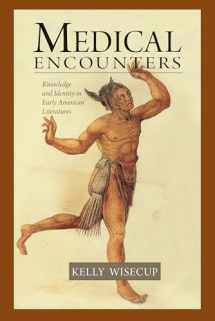
Medical Encounters: Knowledge and Identity in Early American Literatures (Native Americans of the Northeast)
Book details
Summary
Description
The conquest and colonization of the Americas resulted in all kinds of exchanges, including the transmission of diseases and the sharing of medicines to treat them. In this book, Kelly Wisecup examines how European settlers, Native Americans, and New World Africans communicated medical knowledge in early America, and how the colonists represented what they learned in their literatures.
Against the prevailing view that colonial texts provide insight only into their writers' perspectives, Wisecup demonstrates that Europeans, Natives, and Africans held certain medical ideas in common, including a conception of disease as both a spiritual and a physical entity, and a belief in the power of special rituals or prayers to restore health. As a consequence, medical knowledge and practices operated as a shared form of communication on which everyone drew in order to adapt to a world of devastating new maladies and unfamiliar cures.
By signaling one's relation to supernatural forces, to the natural world, and to other people, medicine became an effective means of communicating a variety of messages about power and identity as well as bodies and minds. Native Americans in Virginia and New England, for example, responded to the nearly simultaneous arrival of mysterious epidemics and peoples by incorporating colonists into explanations of disease, while British American colonists emphasized to their audiences back home the value of medical knowledge drawn from cross-cultural encounters in the New World.


We would LOVE it if you could help us and other readers by reviewing the book
Book review



